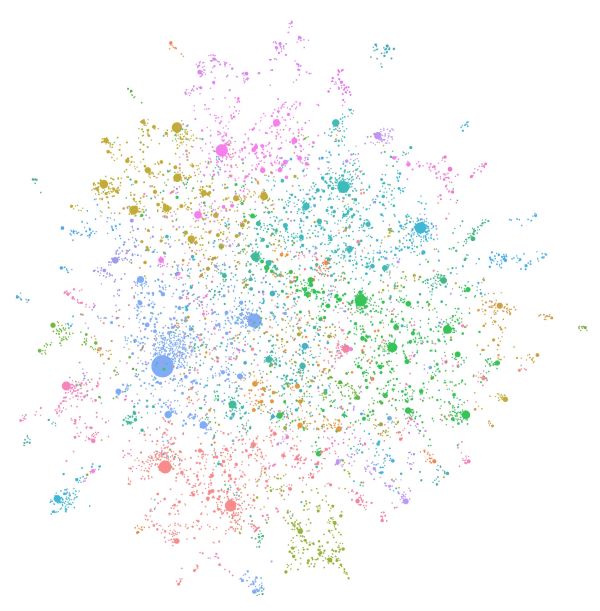graphrag

Graphrag
Graphrag是什么?
GraphRAG 是一种结构化的、分层的检索增强生成(RAG)方法,而不是使用纯文本片段的语义搜索方法。GraphRAG 过程包括从原始文本中提取出知识图谱,构建社区层级(这种结构通常用来描述个体、群体及它们之间的关系,帮助理解信息如何在社区内部传播、知识如何共享以及权力和影响力如何分布),为这些社区层级生成摘要,然后在执行基于 RAG 的任务时利用这些结构。
GraphRAG 是一个旨在利用大语言模型(LLMs)从非结构化文本中提取结构化数据的数据处理工具套件。
GraphRAG可以通过LLM来实现自动的创建知识图谱。
Graphrag安装与配置
官方版本:
Solution Accelerator 包,该包提供了与 Azure 资源的端到端用户体验。
但是在官方版本中不支持ollama本地大模型。如果使用官版本+Ollama会有很多的坑,部分代码需要修改。
找到一个可以作用本地ollam服务的版本:
graphrag-local-ollama 配置
- 安装ollama, https://ollama.com/download
Linux:
curl -fsSL https://ollama.com/install.sh | sh
Get LLM (https://ollama.com/library):
ollama pull mistral
ollama pull nomic-embed-text
- Conda environment, python version >= 3.10
conda create -n rag python=3.10
conda activate rag
pip install ollama
Ubuntu 20.04 安装 python3.10的方法:
sudo add-apt-repository ppa:deadsnakes/ppa -y
sudo apt update
sudo apt install python3.10 python3.10-venv python3.10-dev
# install pip
wget https://bootstrap.pypa.io/get-pip.py
python3.10 get-pip.py
git clone https://github.com/TheAiSingularity/graphrag-local-ollama.git
cd graphrag-local-ollama/
pip install -e .
- 准备测试数据
mkdir -p ./ragtest/input
cp input/* ./ragtest/input
- Initialize the ./ragtest folder to create the required files:
python -m graphrag.index --init --root ./ragtest
- 配置settings.yaml与.env
可以参考graphrag-local-ollama中的配置文件
cp settings.yaml ./ragtest
主要是修改以下内容:
encoding_model: cl100k_base
skip_workflows: []
llm:
api_key: ${GRAPHRAG_API_KEY}
type: openai_chat # or azure_openai_chat
model: mistral
model_supports_json: true # recommended if this is available for your model.
# max_tokens: 4000
# request_timeout: 180.0
api_base: http://localhost:11434/v1
embeddings:
## parallelization: override the global parallelization settings for embeddings
async_mode: threaded # or asyncio
llm:
api_key: ${GRAPHRAG_API_KEY}
type: openai_embedding # or azure_openai_embedding
model: nomic-embed-text
api_base: http://localhost:11434/api
如果是使用ollama, 那么不需要配置.env,不需要修改api_key。 需要修改两处model以及api_base.
如果ollama不是运行在本机,那么http://localhost:11434要替换成服务器的IP地址, 并确保端口是可访问的sudo ufw allow 11434.
- Run the indexing, which creates a graph:
python -m graphrag.index --root ./ragtest
可能需要运行比较长的时间。每次运行会在output下生成一个以时间戳命名的文件,可以使用--resume xxx 来节省时间,使用此参数后会生成一个以xxx命名的文件。
- Run a query: Only supports Global method
python -m graphrag.query --root ./ragtest --method global "What is machine learning?"
- Visualization
Pass the path to the .graphml file to the below line in visualize-graphml.py:
graph = nx.read_graphml('output/20240708-161630/artifacts/summarized_graph.graphml')
python visualize-graphml.py

Tips
官方 graphrag 安装
pip3.10 install graphrag
or
pip install git+https://github.com/microsoft/graphrag
ollama如何使用
- 如何给ollama配置代理
ollama并不会使用命令行里设置的代理。
cat /etc/systemd/system/ollama.service
Environment="https_proxy=http://109.105.32.96:55685"
Environment="http_proxy=http://109.105.32.96:55685"
- 如何修改存储位置
Environment="OLLAMA_MODELS=/mnt/data/Software/LLM_Models"
对于Windows,可以设置环境变量OLLAMA_MODELS。
- 如何重启
sudo systemctl daemon-reload
sudo systemctl restart ollama
sudo systemctl restart ollama.service
- 如何查看运行状态
sudo systemctl status ollama
Issues
- Error running pipeline
{"type": "error", "data": "Error running pipeline!", "stack": "Traceback (most recent call last):\n File \"/mnt/data/Software/miniforge/envs/rag/lib/python3.10/site-packages/graphrag/index/run.py\", line 325, in run_pipeline\n result = await workflow.run(context, callbacks)\n File \"/mnt/data/Software/miniforge/envs/rag/lib/python3.10/site-packages/datashaper/workflow/workflow.py\", line 369, in run\n timing = await self._execute_verb(node, context, callbacks)\n File \"/mnt/data/Software/miniforge/envs/rag/lib/python3.10/site-packages/datashaper/workflow/workflow.py\", line 410, in _execute_verb\n result = node.verb.func(**verb_args)\n File \"/mnt/data/Software/miniforge/envs/rag/lib/python3.10/site-packages/graphrag/index/verbs/graph/clustering/cluster_graph.py\", line 102, in cluster_graph\n output_df[[level_to, to]] = pd.DataFrame(\n File \"/mnt/data/Software/miniforge/envs/rag/lib/python3.10/site-packages/pandas/core/frame.py\", line 4299, in __setitem__\n self._setitem_array(key, value)\n File \"/mnt/data/Software/miniforge/envs/rag/lib/python3.10/site-packages/pandas/core/frame.py\", line 4341, in _setitem_array\n check_key_length(self.columns, key, value)\n File \"/mnt/data/Software/miniforge/envs/rag/lib/python3.10/site-packages/pandas/core/indexers/utils.py\", line 390, in check_key_length\n raise ValueError(\"Columns must be same length as key\")\nValueError: Columns must be same length as key\n", "source": "Columns must be same length as key", "details": null}
在使用原版graphrag + ollama时遇到这个问题,期初认为是setting配置的问题,实际上是代码的问题。
- 解决requests不信任自签名证书的问题
python requests库使用了certifi这个库来存储证书,所以默认情况下不使用系统的证书目录来进行验证。
查看certificate 位置:
import certifi
print(certifi.where())
如果你把额外的证书放在PEM捆绑文件中,你可以使用这两个环境变量来覆盖Python OpenSSL和Requests使用的默认证书存储:
export SSL_CERT_FILE=/etc/ssl/certs/S.pem
export REQUESTS_CA_BUNDLE=/etc/ssl/certs/S.pem
- Run pipeline error

References
-
https://docs.useanything.com/installation/desktop/linux#install-using-the-installer-script
-
如何在Python中使用certifi(附实例)尼耳多
-
Python certifi:如何在Python中使用SSL证书尼耳多